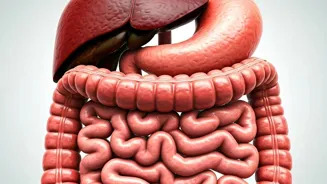Recognizing Digestive Wellness
A healthy digestive system operates efficiently, typically unnoticed by the individual. Key indicators of good digestion include regular bowel movements,
usually occurring once or twice daily, with stools that are well-formed and easy to pass. There should be minimal bloating, gas, or abdominal discomfort after meals. A healthy digestive system efficiently absorbs nutrients from food, leading to sustained energy levels throughout the day. Moreover, you should experience a general sense of well-being, reflecting the harmonious balance of the gut microbiome and the overall digestive process. The absence of persistent digestive symptoms like heartburn, constipation, or diarrhea also signals a healthy state.
Identifying Common Problems
Digestive issues can manifest in various ways, with some of the most common being constipation, characterized by infrequent bowel movements and difficulty passing stools. Bloating and excessive gas, often causing discomfort and abdominal distension, are also prevalent. Heartburn and acid reflux, leading to a burning sensation in the chest and throat, indicate problems with the lower esophageal sphincter. Diarrhea, marked by frequent and loose stools, may be caused by infection, food intolerance, or other underlying conditions. Other symptoms include nausea, vomiting, and abdominal pain, ranging from mild to severe. The severity and combination of these symptoms provide clues to the underlying cause.
Dietary Habits Matter
Dietary choices play a significant role in maintaining digestive health. Eating meals at regular intervals helps regulate the digestive process. Chewing food thoroughly aids digestion by breaking down food particles into smaller pieces, making it easier for the body to process. Staying adequately hydrated is crucial, as water helps in the movement of food through the digestive tract and prevents constipation. A diet rich in fiber, found in fruits, vegetables, and whole grains, supports healthy bowel movements and promotes a balanced gut microbiome. Avoiding excessive consumption of processed foods, sugary drinks, and unhealthy fats minimizes strain on the digestive system and prevents inflammation. The body thrives when wholesome foods are the foundation.
Benefits of Balanced Diet
Incorporating certain food groups and nutrients into the diet can significantly benefit digestive health. Probiotic-rich foods, such as yogurt, kefir, and fermented vegetables, introduce beneficial bacteria that support a healthy gut microbiome. Prebiotic-rich foods, like onions, garlic, and bananas, serve as food for these beneficial bacteria, promoting their growth and activity. Fruits and vegetables, rich in fiber and antioxidants, promote healthy bowel movements and reduce inflammation. Lean proteins, such as fish, poultry, and legumes, provide essential nutrients without overburdening the digestive system. Foods like ginger and peppermint have natural anti-inflammatory properties and can help soothe digestive discomfort. The careful selection of nutritious foods contributes to a well-functioning gut.
Importance of Proper Eating
Eating in a relaxed, mindful state enhances digestion. Eating slowly allows you to fully savor your food and signals the brain to release digestive enzymes, improving nutrient absorption. Avoid eating large meals at one sitting, as this can overwhelm the digestive system. It's best to break the meals into smaller portions throughout the day. Reducing distractions during meals, such as watching TV or using electronic devices, allows for focused eating, which promotes better digestion. Listening to your body's hunger and fullness cues prevents overeating and supports a healthy digestive rhythm. Creating a calm and positive eating environment contributes to optimal digestive function.












